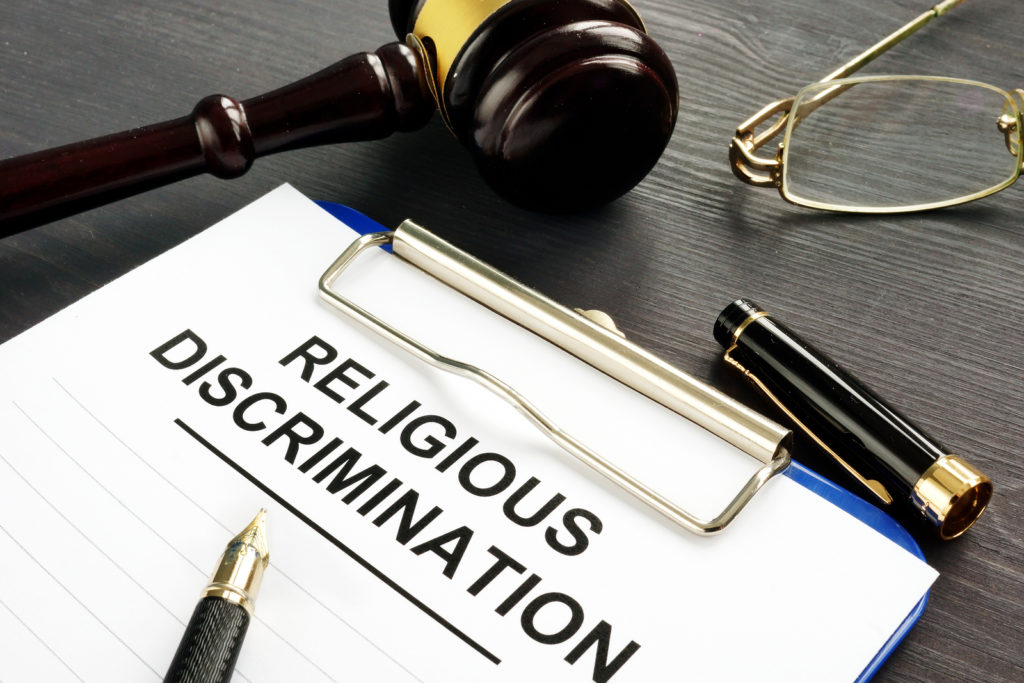Mar 20, 2019 | Constitutional Rights, Discrimination
Religion is a personal choice, no matter what the denomination. You may choose to share your beliefs with others, or you may keep them to yourself. You may also eschew religion if you choose to. But religious discrimination is not a choice your employer has a right to make.
One of the most demeaning forms of discrimination is on the basis of your choice of religion. Whether you grew up with your religion beliefs, or chose them later, it should never be used against you. If it is, your civil rights have been violated through religious discrimination. And in the workplace, you may have grounds for a lawsuit.
The First Amendment
What it actually says is:
Congress shall make no law respecting an establishment of religion, or prohibiting the free exercise thereof; or abridging the freedom of speech, or of the press; or the right of the people peaceably to assemble, and to petition the government for a redress of grievances.
There is no “national religion” in the U.S., as there are in other countries, nor limitations on the practice of religion.
Title VII of the Civil Rights Act of 1964 also prohibits employers from discriminating against employees.
Two types of religious discrimination
There are two general ways that you could be harassed based on your religion:
-
Quid Pro Quo, (Latin for “this and that”), when you are required to alter or abandon a religious belief in order to obtain employment, or an adverse action that occurs after you accept a position but refuse to change your beliefs.
-
A Hostile Work Environment, in which you are subjected to negative comments and/or actions that create a hostile work environment, and suffer a “negative employment action.” Employers are responsible for the actions of their employees.
There are some exceptions. Religious organizations, by their very nature, have the right to hire based on their own religious beliefs, especially if it’s activities are religious on a day-to-day basis. Clergy members are also prohibited from filing religious discrimination lawsuits, because doing so would allow the government to interfere in religious activities. They are not, however, exempt from other forms of discrimination, such as race based or sex based.
Proving religious discrimination
If you believe you are the victim of religious discrimination, it’s important to:
- Report each incident of religious discrimination to your employer
- Personally document each incident, as well as each time you report an incident
Should your employer fail to take corrective action, you can file a Claim of Discrimination with either the EEOC or the Colorado Civil Rights Division (CCRD). You’ll have 300 days from the act of religious discrimination in which to file your complaint with the EEOC, or 180 days with the CCRD. After that, you will lose your right to file your religious discrimination claim under Title VII or Colorado law.
The American Bar Association’s criteria for a prima facie case states that a plaintiff must show that:
- The harassment occurred because of, or was motivated by, religion
- The conduct was pervasive or severe
- The conduct had a detrimental effect on the plaintiff and
- The harassment would have had such an effect on a reasonable person of the same religion in that position
Once you successfully prove your claim of religious discrimination, there are a number of remedies available under the law. You may be awarded compensatory damages including lost wages and benefits, emotional distress, and occasionally, punitive damages. You may also be awarded attorney’s fees and litigation costs. The court could also require the company to reinstate you, and issue an injunction against the company barring them from committing further acts of discrimination.
An attorney who specializes in civil rights violations and employment or religious discrimination can help you navigate this complicated area of law.
Denver’s civil rights attorney
You have the right to your own religion, guaranteed by the First Amendment. Employment discrimination in any form is a difficult and complex area of the law. Need help? Call the Civil Rights Litigation Group at (720) 515-6165, or use our online contact form, to schedule your free consultation with us today. We’ll aggressively defend you in court and make sure your rights are protected under the First Amendment.
Feb 21, 2018 | Discrimination, Employee Rights

What qualifies as discrimination?
Merriam-Webster’s Dictionary defines discrimination as,
- prejudiced or prejudicial outlook, action, or treatment, racial discrimination
- the act, practice, or an instance of discriminating categorically rather than individually
It can also mean the act of distinguishing or differentiating. But in the area of civil rights, discrimination isn’t always cut and dried.
At-will employment and discrimination
Colorado is one of the many states that have employment-at-will. This means that you or your employer can implement or terminate your employment at any time. Two weeks’ notice is a business practice, not the law, and you can be terminated on a moment’s notice, without notice. The company doesn’t need a reason, nor do they have to let you know in advance (although many companies do give advance notices of layoffs.)
You also don’t need a reason to quit, nor let your employer know in advance that you are terminating your employment. However, giving inadequate notice may affect your application for unemployment benefits. (Even if you are discharged for a different reason like medical conditions, harassment in the workplace, and hazardous working conditions, you can still apply for unemployment.)
Workplace discrimination
If you ask most people, they’ll probably tell you that discrimination doesn’t really exist anymore because of the legal protections in place. Unfortunately, that’s not actually true. Discrimination is a little harder to prove, but it does still exist in various forms.
The US has a number of laws against workplace discrimination:
Other forms of discrimination may be based on religion or sexual orientation, harassment, (sexual and non-sexual), and retaliation. Individuals in these groups are known as “protected classes,” and may be the focus of discrimination.
It may be unfair — but is it discrimination?
Discrimination can manifest in two ways:
- Direct—being treated less favorably than the person next to you
- Indirect—imposing a condition that you are unable to comply with
For instance: early retirement may be offered to employees who have been with the company for many years and are eligible for retirement. But in many cases, mandatory retirement may amount to age discrimination.
Another instance is a company adding a requirement to a job function knowing that some individuals could not meet the requirement.
Determining discrimination
Here are some questions to consider whether you are being discriminated against:
- Are you, or others like you, being singled out?
- Are you a member of a protected class, but experiencing unfair treatment or termination/layoffs? (I.e., workers over 50 being laid off and replaced by much younger employees.)
- Are others in a protected class (LGBT, Latino women) being singled out as well?
- Is there a pattern of bias or discrimination against a particular class, such as minorities or women, consistently being passed over for promotions or job transfers?
- Are complaints of harassment or other adverse working conditions being ignored?
- Has your workload or work schedule changed, but no one else’s has?
- Have you or others recently reported wrongdoing, but are now being retaliated against? (Fewer work hours, demotion, pay cut, etc.)
- Have you consistently done a good job, but are now receiving disciplinary notices?
These are just some of the ways you may be able to determine if there is discrimination and not a complete list of questions to ask.
Document all evidence
Most employers will deny any and all accusations of discrimination, even if it’s blatantly obvious. You’ll need some tools in your arsenal to fight back.
If you believe you’re being targeted for discrimination, your best defense is to document as much as you can. Direct evidence is best, but you may only have circumstantial evidence.
-
Performance reviews — you probably won’t be told outright that you are being terminated for an illegal reason. Instead, the official reason may be poor performance, company policy violations, or something similar. If your company does regular performance reviews (some do yearly, some do quarterly, etc.) get and keep copies where they will always be available. Paper copies kept at home are good, but an electronic copy in your Drive, Dropbox, or other cloud storage as a backup is even better.
-
Your job description — do you have a copy? Get one, and keep it on file, both paper and electronic, along with your performance reviews. Should your company suddenly terminate you for “performance issues,” you’ll be able to show what you were doing, and how it was satisfactory if you were passed over for promotion or terminated in favor of someone less qualified.
-
Employment contract — if your company uses them, get a copy if you don’t have one. As your HR department.
-
Keep any relevant communications — save memos, texts, emails, phone messages, or anything else that can show bias may be used against you.
-
Timing of termination, demotion or other adverse event — if you informed your employer of your medical condition, (i.e., pregnancy) and were abruptly terminated shortly thereafter, this may prove discrimination.
-
Medical records — if you have a disability and/or medical condition, these can be added into evidence to back up your claim that you may have been illegally terminated for medical reasons.
-
Medical treatment — if you’ve sought out mental health assistance as a result of harassment or other adverse work conditions, your attorney will also need to be informed. You’ll be asked to provide contact information of doctors, counselors, etc.
-
Termination documents — should your employer give you a suspicious reason for termination (i.e., chronic tardiness), request express written proof of their claim. If you had not committed this violation of company policy, you will have evidence that shows it was not the actual reason for your termination. Get copies of any documentation related to your termination.
-
Testimonies — both your own personal testimony and that of witnesses can be very strong corroborating evidence to prove your case. This helps avoid the “he said, she said” type of case.
Whatever you have to give to your attorney will go a long way in helping him or her defend you in a discrimination complaint.
Workplace discrimination is against the law
There are strict laws in the U.S. against discrimination. If you believe you’ve been the target of workplace discrimination, call the Civil Rights Litigation Group in Denver at (720) 515-6165 for a free consultation. We’re experienced in helping people like you fight back. We can help you file your EEOC complaint, and represent you in court when the time comes.



